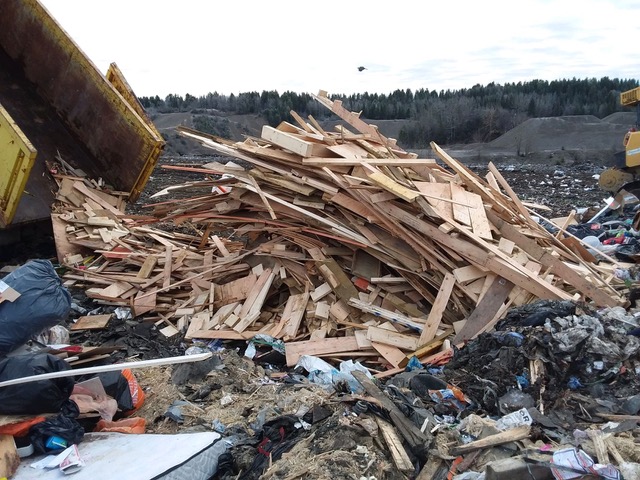B.C.’s efficient waste management system makes the province a leader in recycling across Canada. The latest annual report released by Recycle BC showed an impressive recovery of 78 per cent of plastic, paper, metal and glass.
What Vancouverites and others living in urban centres might not know, though, is that for their neighbours in the rural regions and on the province’s smaller islands, recycling is not quite as simple as rolling a bin out on garbage day.
“If you live in Victoria or Vancouver, you put your blue box out and it gets picked up and taken away,” said Dannielle Alan, the director for electoral area H at the Fraser-Fort George Regional District. “In McBride, there is no curbside service and only limited recycling. Everybody brings their recyclables to that central collection point from where it is trucked out.”
In sparsely populated areas like McBride — located about a two-and-a-half-hour drive southeast of Prince George — the lack of an economy of scale, coupled with the logistics of transporting recyclable waste, makes it difficult to offer effective recycling options to residents.
“We also don’t have a landfill,” Alan said. “We have a few recycling bins set up and our recycling goes out to Prince George.”
Sheila Molloy, executive director of the Coast Waste Management Association, echoed Alan’s concern about the logistical challenges. B.C.’s smaller and more remote islands face a similar problem, she added.
“You’ve got to get a certain amount of stuff to make it worthwhile to put it on a barge or put it in a truck and get it to the next place that it’s going,” Molloy said, describing the process of recycling on the province’s islands. “Diverting it all from a landfill is an expensive process.”
Agricultural areas face obstacles to recycling their plastic farm waste, too.
“Recycling our twine or silage wrap is a challenge, because they always say it’s too dirty, you can’t use it,” said Leonard Hiebert, the area D electoral director at Peace River Regional District. “Trying to find markets for those other than the landfill is a big challenge.”
China’s recent restrictions on importing scrap plastic has also made it difficult for farmers to understand what can and can’t be sold, Hiebert says. This leads many farmers to put unaccepted types of plastic in the pile they send for recycling, but when that happens the entire pile is deemed contaminated and sent to the landfill, he says.
In some cases, regional districts are teaming up to find shared solutions in order to reduce the burdens on their landfills and their taxpayers.
The regional districts of Bulkley-Nechako, Fraser-Fort George and Peace River recently began a three-year-long agricultural plastic management pilot project with the non-profit organization Cleanfarms. As part of this initiative, farmers will be able to recycle agricultural plastic twines, bale wraps, silage bags and bunker covers at no cost.
In other rural areas, locals find ways to reduce, reuse and even repair the waste they produce instead of recycling.
Many people, however, feel that these issues need to be addressed at a provincial level to relieve the burden from smaller communities.
Mark Fisher, area director of the regional district of Bulkley-Nechako, is confident that a provincial extended producer responsibility program covering commercial, industrial and institutional recycling would help create an efficient recycling system in rural B.C.
This program puts the burden of the cost of recycling on the producers.
So far, the EPR program is limited to residential recycling, which doesn’t help much in rural regions with small population sizes. As of yet, the program doesn’t include businesses, schools or other industries that generate recyclable waste.
“You can’t have a recycling facility if you don’t have enough material,” Fisher said. “We need provincial EPR extended for this.”
Regional recycling recovery targets, Fisher added — which means giving businesses and other producers a region-specific target to recover the recyclable packaging, as opposed to an overall provincewide target — would need to be coupled with the extended EPR in order for recycling to function properly in rural areas of B.C.
Susan Maxwell, director of Zero Waste B.C., echoed Fisher’s suggestions, saying that the province’s current EPR regulations need to be updated to better incorporate rural areas.
“The only hard target that exists in the regulation is that the producers need to collect 75 per cent of the material that they’re putting out there,” Maxwell said. “When you look at how the population is spread across the province, if you had awesome collection networks in Metro Van, Fraser Valley and other urban areas, you could pretty much meet that without doing much in the smaller rural communities.”
“As a province, the overall recycling recovery is pretty good. In the big centres, it’s amazing. In the rural centres, it’s not so good,” Fisher added. “There is room for improvement because it’s not fair or equitable. It should be a good system for everybody.” ![]()
Read more: Environment
















Tyee Commenting Guidelines
Comments that violate guidelines risk being deleted, and violations may result in a temporary or permanent user ban. Maintain the spirit of good conversation to stay in the discussion.
*Please note The Tyee is not a forum for spreading misinformation about COVID-19, denying its existence or minimizing its risk to public health.
Do:
Do not: